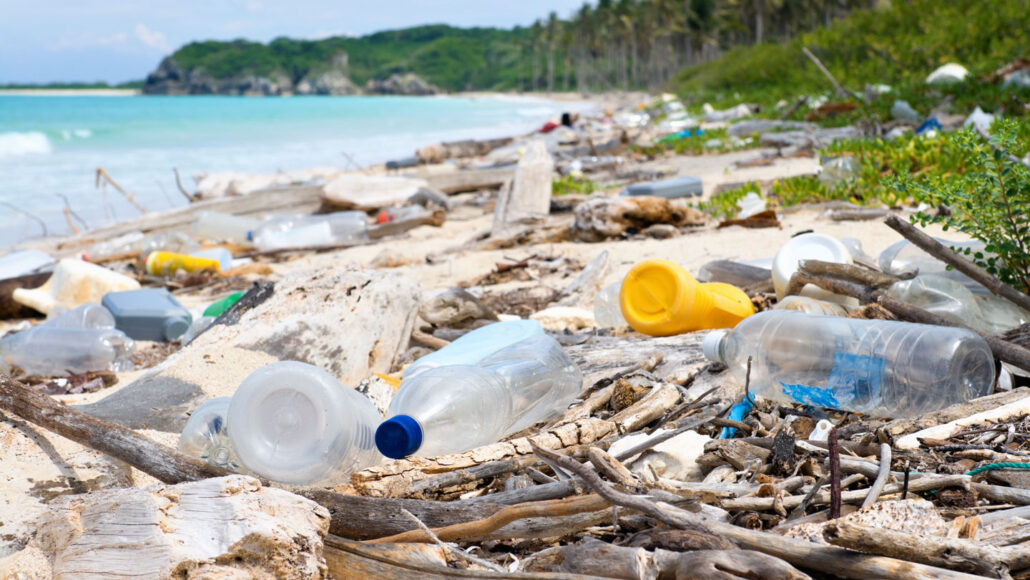acid rain: Any type of precipitation — rain, sleet, snow — that has picked up air pollutants (such as nitric acid or sulfuric acid) that have turned it acidic. Any pH value below 7 is acidic. Normal rain has a pH of about 5.6. Acid rain usually has a pH between 4.4 and 4.2. As it flows across the ground and into streams, this acid rain can harm plants and animals, such as insects and fish.
ash: (in geology) Small, lightweight fragments of rock and glass spewed by volcanic eruptions.
birds: Warm-blooded animals with wings that first showed up during the time of the dinosaurs. Birds are jacketed in feathers and produce young from the eggs they deposit in some sort of nest. Most birds fly, but throughout history there have been the occasional species that don’t.
bloom: (in microbiology) The rapid and largely uncontrolled growth of a species, such as algae in waterways enriched with nutrients.
chemical: A substance formed from two or more atoms that unite (bond) in a fixed proportion and structure. For example, water is a chemical made when two hydrogen atoms bond to one oxygen atom. Its chemical formula is H2O. Chemical also can be an adjective to describe properties of materials that are the result of various reactions between different compounds.
environment: The sum of all of the things that exist around some organism or the process and the condition those things create. Environment may refer to the weather and ecosystem in which some animal lives, or, perhaps, the temperature and humidity (or even the placement of things in the vicinity of an item of interest).
eruption: (in geoscience) The sudden bursting or spraying of hot material from deep inside a planet or moon and out through its surface. Volcanic eruptions on Earth usually send hot lava, hot gases or ash into the air and across surrounding land. In colder parts of the solar system, eruptions often involve liquid water spraying out through cracks in an icy crust. This happens on Enceladus, a moon of Saturn that is covered in ice.
fertilizer: Nitrogen, phosphorus and other plant nutrients added to soil, water or foliage to boost crop growth or to replenish nutrients that were lost earlier as they were used by plant roots or leaves.
haze: Fine liquid or solid particles scattered through the atmosphere that make it hard to see. Haze can be caused by harmful substances such as air pollutants or by water vapor.
hygiene: Behaviors and practices that help to maintain health.
light pollution: The intrusion of unwanted light into areas that would naturally remain dark. Light pollution interferes with our ability to view the night sky. It also alters the circadian rhythms of plants, animals and people.
moisture: Small amounts of water present in the air, as vapor. It can also be present as a liquid, such as water droplets condensed on the inside of a window, or dampness present in clothing or soil.
nitrogen: A colorless, odorless and nonreactive gaseous element that forms about 78 percent of Earth's atmosphere. Its scientific symbol is N. Nitrogen is released in the form of nitrogen oxides as fossil fuels burn. It comes in two stable forms. Both have 14 protons in the nucleus. But one has 14 neutrons in that nucleus; the other has 15. For that difference, they are known, respectively, as nitrogen-14 and nitrogen-15 (or 14N and 15N).
noise pollution: Harmful or annoying levels of noise. Too much traffic and other human-caused noises can make animals nearby change their behaviors — or even make them leave. Harmful levels of noise can also cause permanent damage to human hearing.
oxide: A compound made by combining one or more elements with oxygen. Rust is an oxide; so is water.
physical: (adj.) A term for things that exist in the real world, as opposed to in memories or the imagination. It can also refer to properties of materials that are due to their size and non-chemical interactions (such as when one block slams with force into another).
plastic: Any of a series of materials that are easily deformable; or synthetic materials that have been made from polymers (long strings of some building-block molecule) that tend to be lightweight, inexpensive and resistant to degradation. (adj.) A material that is able to adapt by changing shape or possibly even function.
pollutant: A substance that taints something — such as the air, water, our bodies or products. Some pollutants are chemicals, such as pesticides. Others may be radiation, including excess heat or light. Even weeds and other invasive species can be considered a type of biological pollution.
sewage: Wastes — primarily urine and feces — that are mixed with water and flushed away from homes through a system of pipes for disposal in the environment (sometimes after being treated in a big water-treatment plant).
smog: A kind of pollution that develops when chemicals react in the air. The word comes from a blend of “smoke” and “fog,” and was coined to describe pollution from burning fossil fuels on cold, damp days. Another kind of smog, which usually looks brown, develops when pollutants from cars react with sunlight in the atmosphere on hot days.
sulfur dioxide: A compound made of sulfur and oxygen. It is one of the pollutants that can form when a fossil fuel is burned. It’s also a gas naturally emitted during volcanic eruptions. Its scientific symbol is SO2.
toxic: Poisonous or able to harm or kill cells, tissues or whole organisms. The measure of risk posed by such a poison is its toxicity.
whale: A common, but fairly imprecise, term for a class of large mammals that lives in the ocean. This group includes dolphins and porpoises.

